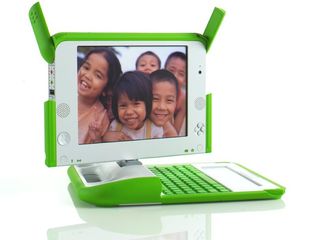Why doesn't one-laptop-per-child work?
Founder of movement throws dice again, but doubts over scheme remain

Nicholas Negroponte, co-founder of the One Laptop Per Child (OLPC) movement, closed the American Academy for the Advancement of Sciences annual conference on Sunday night by detailing the not-for-profit organisation’s progress to date. He told delegates that the movement aims to produce a £25 laptop by 2011.
During his speech, Mr Negroponte also claimed that half a million XO machines are currently on order, with production now ramped up to 110,000 units a month. Anyone sitting in the front row could easily have been fooled into thinking the OLPC is well on the way to meeting its lofty ambitions.
Slow sales and controversy hamper OLPC vision
However, take a step back, study the figures and the harsh truth is that the OLPC project hasn’t taken off as hoped, with sales at best slow and controversy seemingly never far away.
To date, only the governments of Peru and Uruguay have bought any significant quantity of the organisation’s bright green XO laptop, with total worldwide orders to date hovering around the 600,000 mark. More countries have expressed an interest though and the recent Give One Get One scheme in the US is believed to have generated a further 150,000 units. But given that the project was launched nearly three years ago, even the brightest OLPC optimist would have to concede that it's slow-going.
Add to that, the recent loss of Intel as a partner in the programme, alongside the high-profile defection of former chief technology officer, Mary Lou Jepson, and things look a lot bleaker for the OLPC than Mr Neogroponte may have cared to let on during his speech.
Hardware issues or flawed business model?
Get daily insight, inspiration and deals in your inbox
Get the hottest deals available in your inbox plus news, reviews, opinion, analysis and more from the TechRadar team.
So, what is the main problem with the OLPC project? Is it the business model the not-for-profit organisation operates on, the XO laptop itself, a mixture of the two, or perhaps something even more fundamental?
Certainly the OLPC business model has come under fire, both from the leaders of developing countries and also from similar not-for-profit organisations.
Nigeria’s education minister, Dr Igwe Aja-Nwachukuhave, recently told the BBC that laptops for children are a low priority compared to the provision of more basic facilities, a comment that was echoed by his Indian counterpart. Some charities have also questioned whether the cost of a dozen laptops would not be better spent on a more traditional educational aid, such as the creation of a library.
OLPC also faces stiff competition on the hardware front too, meaning there’s no guarantee that the governments of developing nations will choose the XO over a rival laptop. While scaled-down laptops like the Asus Eee and Elonex One appear to be geared towards schoolchildren in developed countries, the XO does face stiff competition from similar developing nations-focused products such as Intel’s Windows XP compatible Classmate laptop, especially now that Intel is no longer on the OLPC board.
A new OLPC machine on the cards?
Last year, during Intel’s short-lived partnership with OLPC, the potential was there for the two organisations to work together. But now that Intel has left the organisation, the OLPC is believed to be looking for other allies – something that Negroponte briefly alluded to in his speech to the AAAS. Could OLPC be about to do a deal with Asus or another scaled-down laptop manufacturer to ramp up production levels and scale down costs even further? Only the next few weeks will tell.
Of course, if OLPC laptops could be offered for free then governments would have to divert funds from elsewhere and the project would almost certainly be falling over itself to keep up with demand. However, given the intense competition between some for-profit technology companies to gain a foothold in the same developing countries the OLPC set out to help, it seems unlikely. And given the highly charged political climate surrounding the movement as well, the chances of finding a workable business model to distribute laptops in developing nations for free seems a very distant proposition.
One thing is for sure, however, Nicholas Negroponte isn’t about to give up trying. As the man himself never tires of saying, the OLPC considers itself a learning initiative, not a laptop-giving initiative. It doesn’t matter whose computer children learn on, the main thing is that they’re learning on something. You can’t really argue with sentiment like that.
The TechRadar hive mind. The Megazord. The Voltron. When our powers combine, we become 'TECHRADAR STAFF'. You'll usually see this author name when the entire team has collaborated on a project or an article, whether that's a run-down ranking of our favorite Marvel films, or a round-up of all the coolest things we've collectively seen at annual tech shows like CES and MWC. We are one.
